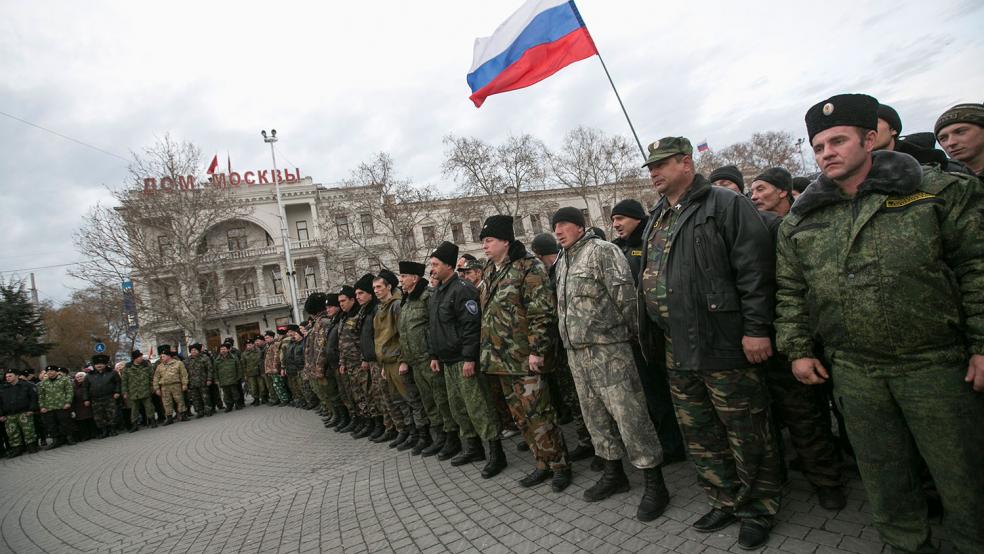Russia is winning the Ukraine crisis. While Moscow may have suffered some economic sanctions, the world saw a disobedient Russian neighbor being forcibly brought to heel. The land grab was no doubt designed to encourage the others—Estonia, Latvia, Hungary, Georgia – all those unfortunates who live nearby. And it will.
There are other winners, even on the side of the somewhat hapless angels. Like Germany, which is currently less an angel, and Poland, which is currently more. Before taking a mildly more aggressive position on sanctions Friday, Germany had been the least enthusiastic major European power about aggressively confronting Russia. Part of this is due to Germany’s oil and gas imports, over a third of which comes from Russia and its other economic ties to the east. It’s not all economics, though: while money plays a part, power plays a bigger one.
Related: Does Putin Want to Carve Up Ukraine and Take the Spoils?
Since both its unifications, Germany has been the strongest European power in a difficult geographic position, surrounded by a stronger Russia and weaker France and Britain. It has usually thus played off one side against the other, in a foreign policy that was neither East nor West but neutralist.
In 1922, for example, post-WWI Germany extended diplomatic recognition to Bolshevik Russia, the first major power to do so. The Rapallo agreement led to secret German-Soviet military cooperation that evaded the treaty’s prohibitions on remilitarization. Later, West German Chancellor Willi Brandt’s controversial Ostpolitik in the 1960s and 70s famously favored closer relations with the USSR, rattling some NATO members.
Berlin’s behavior over the Ukraine is thus a potential reversion to its traditional East-West behavior. Chancellor Angela Merkel will punish Putin when he gets too aggressive, but probably slower and less than her eastern or western neighbors would like. Unless he pushes her too far, as he might now have. But because Germany has solidified its political leadership of Europe by financing away the debt crisis, Europe can’t really react until Berlin does.
Poland also wins, but in a slightly different way. Since the minor crisis in Maidan Square turned into a major crisis in Crimea, Poland has repeatedly and loudly called for stronger action against Russia and its minions.
Related: The Limits of East-West Fusion in Ukraine
It’s no wonder. Poland, as a nation, is a historical trauma case, as close to a collective PTSD state as a people can be. It’s flat, with no natural borders, and is rivaled only by Korea for its frequent geopolitical catastrophes. Like Korea, it lives in a terrible neighborhood, bookended between a baleful Russia and a less baleful but somehow even less reassuring Germany. And thus for long periods of history, Poland has disappeared entirely from the map.
Russia’s behavior in the Ukraine thus set off the usual alarm bells in Warsaw. During Vice President Joe Biden’s visit to Poland on Tuesday, Polish Prime Minister Donald Tusk repeated Poland’s stand: “It is a challenge for the whole world…It is not just Poland, but all of Europe must speak in a strong voice.”
Europe won’t, thanks partially to Germany, but also to the Western European states which don’t really want a serious conflict over ethnic Russians in the Crimea. US help to Poland has also been minimal--a visiting fighter squadron, a few tankers, and some of Joe Biden’s thoughts about gas dependency.
It’s not perhaps overly reassuring, but then it wouldn’t be. Most alliances are negatively defined: they are coalitions against something. NATO lost its core definition for the West in 1991. Hence the growing disconnect with NATO’s eastern members, who thought the basic purpose of the alliance was to defend them against Russia.
Related: Ukraine and the West—A Tale of Two Lifelines
For Poland, Hungary, and Latvia and the other Soviet punching bags there’s only Russia. If NATO won’t defend them– if its bluff was just a bluff – well then, those states will take matters into their own hands. One of the few benefits of a traumatic national upbringing is that you take power very seriously. And they have been thoroughly unimpressed by NATO’s response to Putin.
Because of Russia’s aggression, Poland now has the chance to expand its military power without alarming or incurring pushback from nearby states. It can act more according to its own interests, less muted by the EU, NATO, or the UN, and assume a more regionally assertive role with fewer costs. Russia has given Poland carte blanche to become a regional power, and potentially the linchpin of an eastern coalition against Russia.
That would be an historic shift; Europe has not seen a major eastern European power since the Polish-Lithuanian Commonwealth almost five hundred years ago. And nobody would deserve it more than Putin. Poland can thus come out of the Ukraine crisis a winner; not because the fates have been kind to it, for they never are, but because it can rise with near-impunity. It’s a self-help, tough-love kind of win, but that’s the only kind Poland ever gets.
Top Reads from The Fiscal Times:
- How Obama Crippled a Russian Bank with a Stroke of a Pen
- How Putin Awoke NATO’s Sleeping Giant
- The US-Russia Military Supply Chain Could Snap






